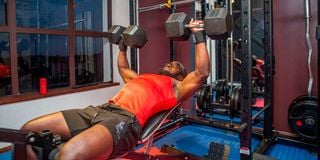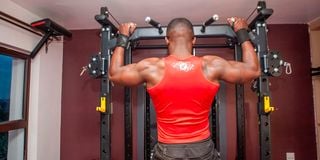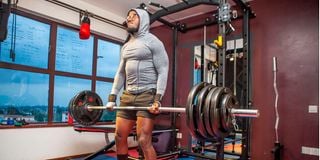Busy schedules, competing priorities and lack of confidence are some of the main reasons why people don’t go to the gym even if they want to. These are just a few of the obstacles people face when trying to find the motivation to work out at community gyms.
From navigating traffic—common during peak gym hours—to lacking the social energy to exercise in crowded spaces, queuing for gym machines and locker rooms, reaching your fitness goals can seem like an impossible dream for many.
Except it doesn’t have to be. If this is you, there are home gyms.
If you have the space and a small start-up budget, you can put together a gym that works for you. So, what does it take to set up a home gym and what are the benefits? BDLife spoke to Eshuchi Lumumba, a long-time fitness enthusiast who works as a teacher, recording artist and interior designer in Nairobi.
“The idea of having a gym at my home came from the discomfort I experienced about two and a half years ago after moving from Lavington in Nairobi to Ruaka. Going to the gym meant I had to take detours at least four times a week – however many times I work out weekly,” he says.

Eshuchi Lumumba does a dumbbell bench press workout at his gym in Ruaka, Kiambu County on September 3, 2024.
Image credit: Billy Ogada | Nation Media Group
The detours meant he would spend up to two hours stuck in traffic just to get to the gym for one hour of training.
“The time I was on the road didn’t make sense to me, and when I looked around I couldn’t find a gym that had the right equipment for my exercise needs,” he says.
He did some quick math and concluded that if he rolled the monthly subscription fees into a lump sum, he would save money in the long run and keep his devices to himself.
“As an interior designer, planning and designing the space was a no-brainer, I installed a floor-to-ceiling mirror – just to bring the shared gym into my private space. I stuck some of my photos on another wall to complete this feeling. I added some downlighters to enhance the aesthetic and also provide enough lighting for my photography (he’s big on that),” he says.
His research before embarking on this process helped him make an informed purchase.

Eshuchi Lumumba exercises on an ab bike at his gym in Ruaka on September 3, 2024.
“When I went shopping, I knew what I could do without. For example, I don’t have a treadmill. It is bulky and takes up a lot of space. I can easily achieve similar results by setting up another station that doesn’t eat up so much space,” he says.
When building your fitness, activity and efficiency are key drivers of your decision-making process. Unlike in general gyms, you may not have the space, money and need for some equipment. What works for you depends on what you are trying to achieve with your body.
Strength training
To maximize the gym’s functionality, Lumumba first installed a rack cage. He then bought enough plates for his strength training and hired a metal fabricator to build a rack for his dumbbells.
“Most if not all types of equipment that require installation in the gym will come with a manual. To reduce costs, you can read the manual and install them yourself. This also helps you know what you have if there is a need to disassemble or fix loose nuts.”
He fixed the floor himself.
“It would have cost me about Sh10,000 to arrange the interlocking rugs. This would have been an unnecessary expense as this is something that anyone can do easily.”

Eshuchi Lumumba works out at his home gym in Ruaka, Kiambu County on September 3, 2024.
Image credit: Billy Ogada | Nation Media Group
Does it make economic sense in the long run? “Yes, it does. “Over the years, I’ve spent less on setting up my gym than I would have spent on membership fees over the past two and a half years,” he says.
He has spent Sh350,000 so far. Money, he says, is a fraction of what he would have paid for a decent gym membership.
“When you think about it, that’s a savings for me,” he says.
Having a gym at home encourages laziness, many people think. It might be one of those things that you’re really annoyed with when you set it up but can only use it once at a time. Lumumba disagrees.
“I have to remind myself not to go to the gym more than my body requires.” For my benefit, I can use it whenever I want. Plus, having it here means I don’t have to get up earlier than I should in the morning to hit traffic both on the road and at various stations in the gym,” he says.

Eshuchi Lumumba works out at his home gym in Ruaka, Kiambu County on September 3, 2024.
Image credit: Billy Ogada | Nation Media Group
In addition to saving time and money, personal fitness increases your immunity. Some people lack the confidence to exercise in spaces with strangers or may have depleted social batteries. Public gyms will be a major obstacle in their fitness journey – an anathema by any definition but a valid reason not to attend retraining or fitness activities. Others require privacy for religious reasons.
“Your own space gives you maximum privacy from people or energies you don’t want to interact with.” It also takes you back from the pressure of doing things in the gym because either a trainer or another gym user is doing them. It saves you from the guilt of the masses when you can’t reach certain levels like other countrymen in the gym. It reminds you to do things at your own pace,” he tells BDLife.
What about maintenance? “Treat your home gym like any other room. It requires regular cleaning and sometimes specialized cleaning. Just like the general gym, it should be routine to disinfect surfaces. Besides, having good ventilation in the room ensures that you keep the gym and the rest of the house fresh,” he says.
Does having a personal gym mean giving up going to the public gym? “I go to my gym when I want a change of scenery. There is no guilt in going to places you visited once,” he says.
#set #Sh350000 #home #gym